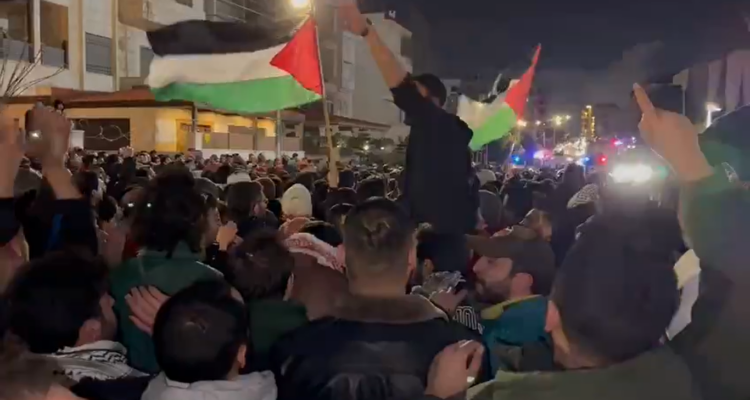If Jordan succumbs to Iran’s designs, it would create yet another front against Israel.
By Dr. Lawrence A. Franklin, Gatestone Institute
The Israeli Air Force (IAF), in a recent airstrike, destroyed three cross-border smuggling routes from Syria to Lebanon, which were being used by Iran to bring ship weapons to still-functioning Hezbollah terrorist cells.
The Israeli strike took place just hours before a ceasefire took effect on November 26 between Israel and Hezbollah.
Iran’s special forces units, however, will no doubt continue their past efforts to smuggle arms through Jordan to Palestinian terrorist cells in Judea and Samaria (“the West Bank”).
These smuggling operations will still enable terrorists there to kill Israelis and further entrench an atmosphere of fear among the hundreds of thousands of Israeli citizens who live in Judea and Samaria.
In one publicized incident, Israel’s internal security agency, the Shin Bet, seized caches of Iranian weapons being smuggled transported across Jordan’s unguarded borders.
The arms included anti-tank missiles, rocket-propelled grenades, as well as Semtex and C-4 plastic explosives.
The Shin Bet reported that the Special Operation Unit 4000 of Iran’s Islamic Revolutionary Guard Corps (IRGC) had been tasked with that mission.
The latest shipment of weapons bound for Palestinian Arabs in Judea and Samaria, intercepted and seized by Israel on November 27, 2004, was initiated from an IRGC camp in Syria.
Iran and its allies, Hamas and Hezbollah, have also been attempting to recruit Jordanians as agents. The project appears an attempt to destabilize the rule of the Hashemite dynasty of King Abdullah II by engaging in acts of sabotage.
Jordan has also been under political pressure and military threats from Iran and Iranian proxy militias in Iraq.
If Jordan succumbs to Iran’s designs, it would create yet another front against Israel.
Kata’ib Hezbollah, the leading Iran-backed terrorist group in Iraq, has pledged to arm 12,000 Jordanian volunteers if they would embrace the anti-Israeli “resistance.”
Hamas official Khaled Mashaal also has been broadcasting to Jordan messages urging Jordanian citizens to join the “resistance.”
Iran’s increased interference in Jordan comes at a problematic time for the Jordanian government. Recent parliamentary elections reflect gains by the opposition.
The Jordanian branch of the Muslim Brotherhood’s Islamic Action Front, for instance, tripled its representation in Jordan’s parliament, giving it one-fifth of the seats.
The uptick in the electoral popularity of the Islamic Action Front in Jordan is not yet a threat to the regime’s stability: the number of its seats in parliament do not yet represent a greater power in Jordan than the king.
Jordan’s capital, Amman, is home to about two million of the country’s Palestinian refugees, who are inclined to support Islamist opposition parties, such as the Islamic Action Front.
The regime’s gerrymandering allocates fewer parliamentary seats to pockets of Palestinian populations while favoring pro-regime tribal candidates.
Traditionally, Jordan’s monarchy has relied on the once-fierce loyalty of Bedouin Arab tribes in rural areas to retain power.
Recently, however, protests are indicating that tribal allegiance to the Hashemite monarchy may be fraying due to economic recession and vast unemployment.
Perhaps the greatest threat to the stability of the monarchy is the Hamas-Israel War, coupled with a fear of mass migration into Jordan of more Palestinians.
King Abdullah II and Foreign Minister Ayman Safadi have both declared their opposition to accepting any people from Gaza. Demographic studies indicate that Palestinians already make up about half of Jordan’s population.
King Abdullah’s efforts to protect Jordan’s sovereignty and maintain its non-belligerent status during regional conflicts are reflected in his statements and actions.
He has emphatically declared that “Jordan will not be a battlefield for any party.”
When pro-Hamas protests in March and April pressured his government to join Hamas in its war on Israel, the king dispatched security forces to crack down on the demonstrators.
When Iran, in April, launched hundreds of missiles and drones at Israel, Jordan protected its airspace, cooperating with air defense efforts to destroy some of Iran’s missiles and drones weapons in flight.
Pro-Iran social media accounts in Jordan have therefore personally targeted King Abdullah by calling him an “American puppet” and “traitor,” while caricaturing him wrapped in an Israeli flag.
Iran appears determined to destabilize Jordan, and is thus trying to drag the kingdom into its regional maelstrom by manipulating Jordanian national and terrorist substate entities to do its bidding.
Iran is also directly challenging the American military presence in Jordan, as evidenced by a January 28 drone attack launched by a Syria-based Iranian proxy militia, which killed three U.S. troops in Jordan.
Iran also wants to reverse the Jordanian monarchy’s moderate policy toward Jerusalem, initiated by Abdullah’s father, King Hussein, who signed a peace treaty with Israel in 1994 and was a long-term US ally.
The Hashemite dynasty’s favorable legacy in the Arab world, and the extensive US financial aid it receives, may no longer be enough to prevent Jordan from losing its balance on its diplomatic tightrope.
The Islamist threat to the stability of the Kingdom has greatly increased with the fall of its neighbor Syria into the hands of the Hay’at Tahrir al-Sham, a Sunni Islamist group committed to radicalizing the Levant, which includes Jordan.





